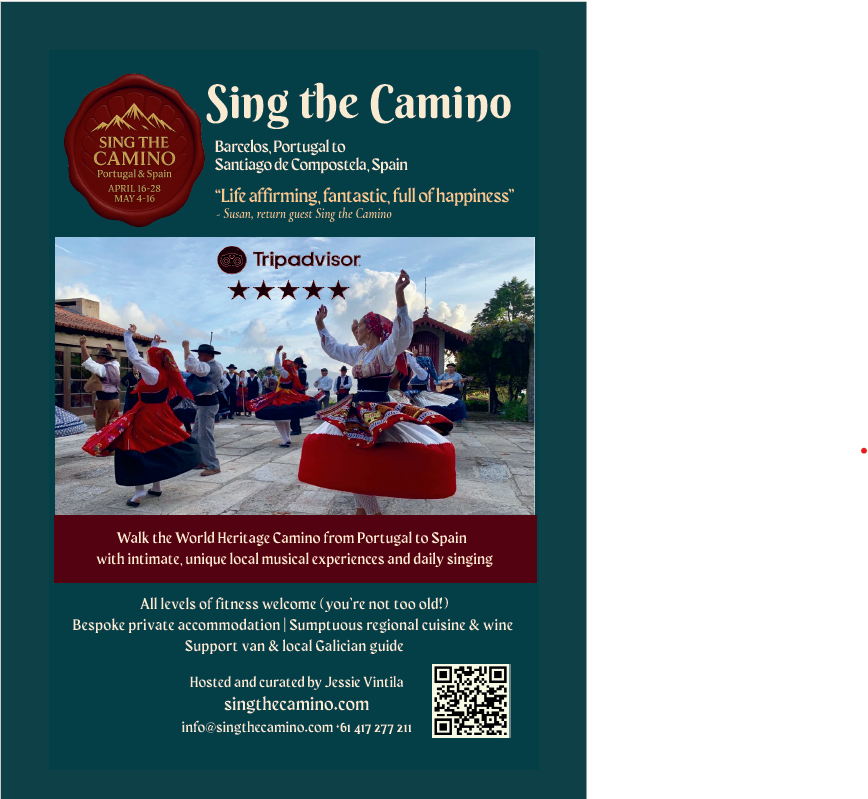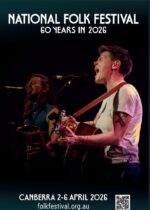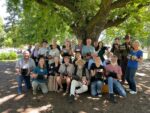Description
Sing the Camino – TN173 Oct 25
Every year, Jessie Vintila, the effervescent director of the Northern NSW Raise the Roof Choirs, moves her work across the world to host groups of travellers on the beautiful Camino de Santiago.
There, her guests enjoy sumptuous cuisine, sleep in ancient buildings, drink wine and enjoy nightly choir sessions, as Vintila infuses the music of the region into the pilgrimage experience, along with other favourite songs in harmony.
Bringing people together through song is a natural vocation for Vintila.
She grew up in a left-wing family of folk and classical musicians, songwriters and music teachers, who fully embraced the music of other cultures and loved to connect with people through song.
As a child, Vintila performed with her mother, Brenda, and grandfather, Ian Conochie, in WA’s folk festivals.
She attended a specialist music high school, and studied jazz flute at the WA Conservatorium of Music.
At 18, she started performing her own music under the name Jessie Rider, and directed her first choir, a role which was to become her life’s passion.
“As a choir director, I have the exquisite pleasure of holding space in which people connect doing things they love, and watching those connections grow,” said Vintila.
A talented songwriter, in 2000 she won a WAMI award for her reconciliation song, Colony.
One of her first choir directing roles was with union choir, Working Voices, filling in for Bernard Carney, who was often away touring.
Vintila ran several community and gospel choirs in Perth and WA’s southwest.
She then moved to Northern NSW where she co-created and toured widely with indie-folk band, The Lucky Wonders, writing songs with Noah Royle, and later started Raise the Roof Choirs.
The Lucky Wonders made it to Triple J and were hailed as one of the best roots bands playing the circuit by the Sydney Morning Herald.
While on a break after a German tour, Vintila and Royle took a holiday.
By accident, they took a lucky wander into the beautiful Pyrenees foothills town of St Jean Pied de Port on the French/Spanish border.
This town was known to many as the start of the famous 800km Camino Frances, which traverses the north of Spain.
“There was a lovely reverent hush over the town, and people walking around, wide eyed and happy, in hiking gear.
“We were camped there for a few days and amazingly I got to jam with a fellow camper, an incredible gypsy guitarist who said he played with the Gypsy Kings.
“We hadn’t planned it, but we fell in love with the open hearted spirit of the Camino”, said Vintila.
“For touring musicians and choir directors, travel and music are like two sides of the same coin, so the idea of inviting people there on a singing walking tour just sparked up for me as a creative enterprise to try.”
Thus, in 2013, the cultural tour company, Sing the Camino, was born.
The first Sing the Camino tours were from Ponferrada, on the Camino Frances, heading 220km west to Santiago de Compostela.
“The night before the first tour, I was staying in an apartment on the edge of the old town plaza when I heard this fabulous singing floating up through the window.
“Lots of boisterous male voices in harmony.
“I was in my pyjamas, so I jumped out of bed, threw on some clothes and chased the sound into the plaza.
“It was a Tuna band, just singing around a table while out to dinner.
“In my beginner Spanish, I managed to hire them on the spot.
They came to sing for our group a few days later, flashmob style, as we finished dinner in this 400 year old casa rural, where we were staying for the night,” said Vintila.
“The buzz of springing this extremely live music on my little group from Australia was totally addictive.
“Suddenly we were partying like it was 1399!”
Tuna bands are like a medieval musical football team, noisy, joyous and irreverent.
Tuna is a Spanish and Portuguese street music tradition akin to mariachi, dating back to the 13th century.
It emerged amongst university students in somewhat of a rebellion to the austerity of Gregorian chanting, which pervaded the times.
Tuna is being kept wonderfully alive by these bands of brilliant and cheeky musicians dressed in medieval capes, with a mix of beautiful and bawdy songs from all over the Spanish and Portuguese speaking world.
The old towns, being made of stone, are full of incredible acoustics for singing.
In Spanish tuna, you can find anything from five to forty members, playing guitars, mandolins, bandurrias (like a 12-string lute), accordions, tambourines, and guitarrons (Mexican bass), and countless voices in harmony.
As the tours continued, Vintila discovered more brilliant musicians, dancers and folklorists lovingly keeping other rich and ancient folk traditions alive.
She became obsessed with fado, the stunning, often melancholic music iconic to Portugal, but also with significant, little known roots in Galicia in Spain.
Over the years, Vintila became close friends with renowned Galician fadistas, Iria Estévez and Gonzo Piña.
“Iria sings fado with the full intensity of emotion but in a very feather light way, different to classic fado”, said Vintila.
“Every single time I hear her sing, it’s goosebumps, and sharing this with our groups is an incredible honour.”
Estévez is currently leading a groundbreaking project researching the untold story of Galician immigrants planting some of fado’s musical seeds in Lisbon in the early 19th century.
Galicia, the lush, green, north western ‘comunidad’ or state of Spain, is also home to very distinct Celtic influenced culture and language.
This is enjoying a revival since the demise of Franco, who banned all languages except Castilian.
All over Galicia, young people can often be seen reclaiming Galician folk dances, instruments including bagpipes, songs and incredible percussion traditions.
“It’s been such a privilege, and so exciting to learn about this wealth of musical traditions and to share some of these riches with our groups.
“As well as our daily singing sessions, we enjoy really intimate concerts from these artists, with stories, costumes, and the chance to join in with their dancing and singing.”
Both avid food and wine lovers, Jessie and Noah also took great care curating menus of local Galician cuisine.
A number of their guests wanted to come back for more, so they designed a second Sing the Camino tour on the lesser known Camino Portuguese, which heads north from Barcelos in Portugal to Santiago de Compostela in Spain.
It’s the path less travelled and the current route of choice for the next tours.
After a Covid hiatus, when travel became possible again in 2023, Jessie re-started the tours with local Galician guide, Rafa García Hernández.
Rafa enriches the tours with his local knowledge and shares Jessie’s genuine passion for giving every guest the best experience possible.
Now owned solely by Vintila, Sing the Camino has become a 12-day journey, walking by day, singing by night, and experiencing some of the unique musical traditions of Galicia, Spain and Portugal.
“The Camino gives people a very simple, albeit physically challenging goal, to walk an ancient path.
“This liberates them from their usual life tasks and goals.
“Combine that with the healing power of music and…voila!
“It’s life affirming and the ultimate combination of music and travel, and no, you don’t have to walk the full 20km per day.
“It’s a holiday, it’s a celebration of life, and it’s your Camino to do your way!”
The next Sing the Camino tours run from April 16-28 and May 4-16, 2026.
See singthecamino.com for more.




